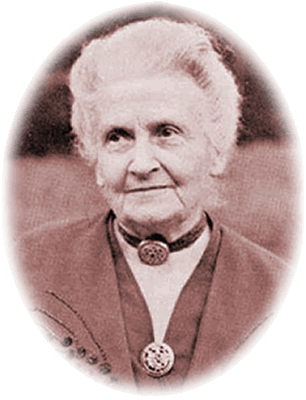MONTESSORI PHILOSOPHY
The Montessori philosophy is a unique and universal approach to education based on scientific observation of the physical and psychological development of the child. It aims to free the individual child’s potential for self-development in an environment specifically prepared for the developmental level of the child.
Who was Maria Montessori?
Dr. Maria Montessori, born in 1870, was a physician, scientist, educator and humanitarian and the first woman to obtain a medical degree in Italy. She began her work with children at the University of Rome and in 1907 opened the first Casa dei Bambini or House of Children in the slums of San Lorenzo. Her “method” developed from her scientific observations of children based on respect for the individual. Maria Montessori, through her observations of children, discovered the importance of the Prepared Environment.
 .
.She discovered it must be beautiful in its simplicity, orderly, accessible, provide freedom to work according to one’s needs, offer materials to explore the world and provide opportunities to interact socially.
The result of offering a prepared environment leads the individual to be as independent as possible, have a meaningful place in society, and have high self esteem and the opportunity to make meaningful contributions to their community.
Some of her many contributions to the work of raising and educating children were:
- Preparing the most natural and life supporting environment for the child (Prepared Environment)
- Observing the child living freely in this environment
- Continually adapting the environment in order that the child may fulfill his greatest potential – physically, mentally, emotionally and spiritually
Dr. Maria Montessori left a wonderful legacy: a philosophy for life, a unique method of education, materials with which to educate and a system of training which is capable of producing teachers who give children the best possible foundation for life.
Open House
Wednesdays 9:30am to 11:00am
Contact Details
- 10131 Bayview Ave., Richmond Hill ON, L4C 2L4
- School: 905-508-5444
- Director: 647-219-6521
- info@northhillmontessori.com
